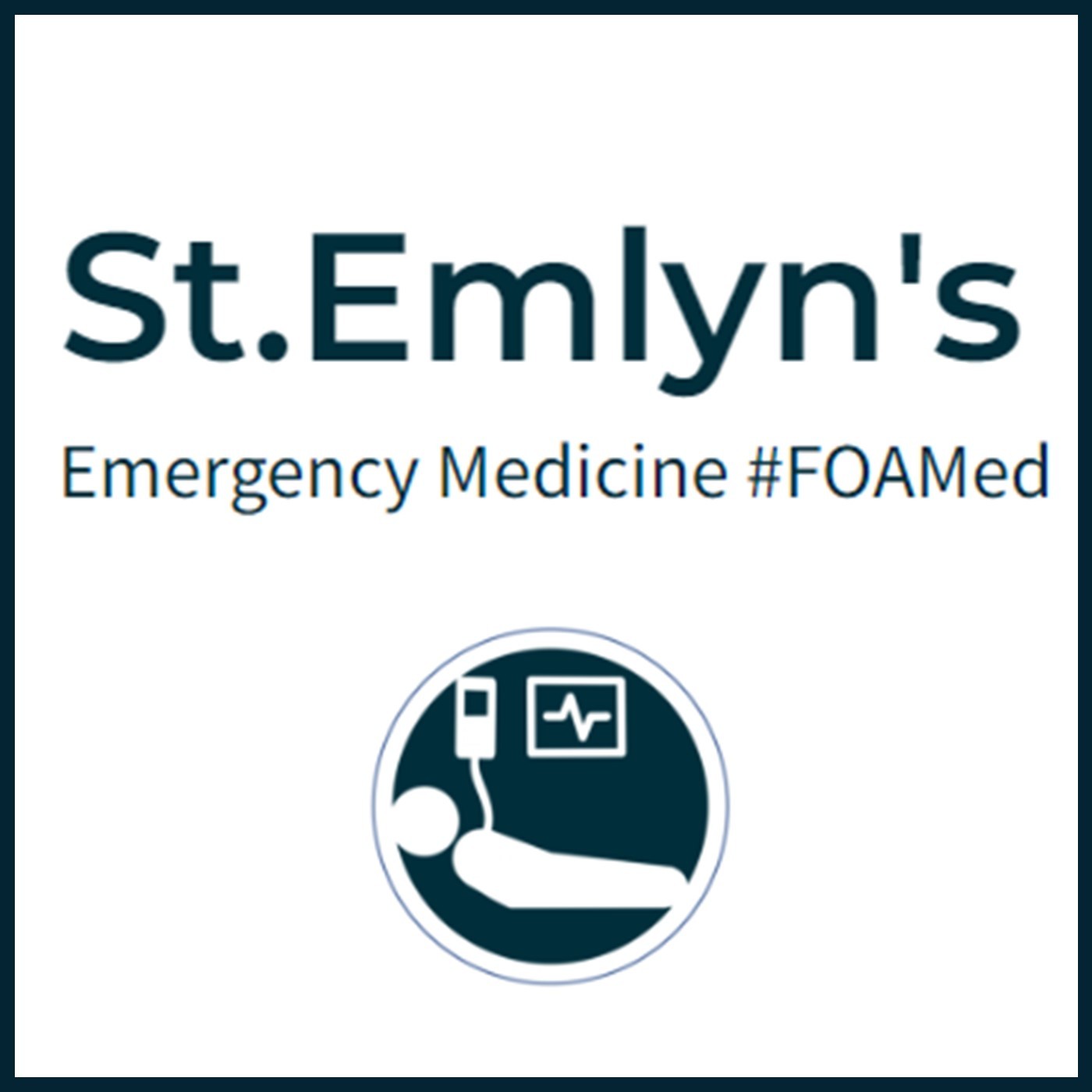
1.3M
Downloads
270
Episodes
A UK based Emergency Medicine podcast for anyone who works in emergency care. The St Emlyn ’s team are all passionate educators and clinicians who strive to bring you the best evidence based education. Our four pillars of learning are evidence-based medicine, clinical excellence, personal development and the philosophical overview of emergency care. We have a strong academic faculty and reputation for high quality education presented through multimedia platforms and articles. St Emlyn’s is a name given to a fictionalised emergency care system. This online clinical space is designed to allow clinical care to be discussed without compromising the safety or confidentiality of patients or clinicians.
Episodes

Thursday May 31, 2018
Ep 112 - Acute Psychiatric Emergencies in the ED.
Thursday May 31, 2018
Thursday May 31, 2018
The Importance of Acute Psychiatric Emergencies Training: Insights from the St Emlyn's Podcast
Introduction
Welcome to the St Emlyn's blog, where we delve into the latest topics and developments in emergency medicine. Today, we explore a crucial yet often overlooked aspect of our field: acute psychiatric emergencies. This post summarizes a recent conversation between Simon Carley and Kevin McRey Jones, highlighting the significance of addressing psychiatric emergencies within emergency departments. We will shed light on the Apex course, its methodologies, and the vital need for integrating psychiatric care into emergency medicine.
Addressing the Gap in Psychiatric Emergency Care
Kevin McRey Jones, a key figure in emergency medicine, recently joined the St Emlyn's podcast to discuss the Apex course, an initiative designed to fill a significant gap in emergency medicine training. Despite considerable advancements in managing various medical emergencies, psychiatric emergencies often remain underemphasized.
The Apex course addresses this gap by focusing specifically on acute psychiatric emergencies. Kevin explained that while many advancements have been made in managing cardiac, trauma, and obstetric emergencies, psychiatry has not received the same systematic approach. This has led to a fragmented care model where physical and psychological components are often treated separately.
The Origins and Purpose of the Apex Course
The Apex course, originating in 1992 with the Advanced Life Support Group, was created to systematize the training for managing acute psychiatric emergencies. Kevin, who has a long history of organizing and delivering courses in emergency medicine, emphasized the need for a unified approach to patient care. The course aims to bridge the gap between emergency physicians and psychiatrists, promoting a co-ownership model of patient management.
Why Psychiatric Emergencies are Often Overlooked
One major reason psychiatric emergencies have not received the same attention as other medical emergencies is the perception that these are problems best handled by psychiatrists or liaison nurses. This mindset leads to a tendency to pass psychiatric cases off to specialists rather than integrating psychiatric care into the emergency department's responsibilities.
Kevin highlighted a common issue where patients with both physical and psychological illnesses are often divided into two separate cases: the physical bit managed by emergency physicians and the psychological bit by psychiatrists. This division can lead to suboptimal care and poor outcomes, as the interconnected nature of these issues is overlooked.
The Consequences of Ignoring Psychiatric Components
Ignoring the psychiatric component of patient care can have severe consequences. Kevin pointed out that patients with psychiatric diseases often have poor outcomes regarding their physical health. This is largely because their physical ailments can be neglected due to the focus on their psychological issues.
Simon added that the outcomes for patients with psychiatric diseases, in terms of their physical health, are often terrible. This emphasizes the need for a more integrated approach to patient care, where both physical and psychological aspects are managed simultaneously.
The Need for Integrated Care
Kevin stressed the importance of co-owning the problem rather than treating psychiatric emergencies as the sole responsibility of psychiatrists. By doing so, emergency departments can provide more comprehensive care, addressing both physical and psychological needs. This integrated approach is essential for improving patient outcomes and ensuring that all aspects of a patient's health are considered.
Common Practices and Their Pitfalls
Simon discussed a common practice in emergency departments where patients presenting with apparent psychiatric problems are often assessed solely for physical issues before being referred to psychiatric specialists. This "clear them medically" approach can lead to delays in psychiatric care and inadequate management of the patient's overall condition.
Kevin acknowledged this issue and emphasized the need for emergency physicians to be involved in the psychiatric assessment and management of these patients. This approach ensures that all aspects of the patient's health are addressed, leading to better outcomes.
Rethinking Emergency Care for Psychiatric Patients
Simon reflected on the current practices and highlighted the need for change. The idea of dividing patient care into physical and psychological components, with little overlap, is increasingly seen as problematic. Kevin agreed, noting that sometimes organic problems can be overlooked when patients are quickly referred to psychiatric care without a thorough assessment.
The Apex Approach: AIOU Methodology
The Apex course introduces the AIOU methodology, designed to integrate psychiatric and medical care seamlessly. This structured approach includes:
- A: Assessment of aggression and agitation.
- E: Environment in which the patient is assessed.
- I: Intent of the patient, including suicidal ideation or harm to others.
- O: Objects the patient may use to carry out their intent.
- U: Unified assessment, combining both physical and psychological evaluations.
Implementing the AIOU Methodology
Kevin explained that the AIOU methodology is a co-created approach by psychiatrists and emergency physicians. This collaboration ensures that both physical and psychological aspects of patient care are addressed. The methodology aligns with the primary assessment, resuscitation, and definitive care phases familiar to emergency physicians.
Addressing Challenges in Psychiatric Emergency Care
Rapid tranquilization is a common concern in managing psychiatric emergencies. Kevin emphasized that the goal is to use the minimum level of intervention required, whether that involves oral medication or, if necessary, safe rapid tranquilization. The course teaches a balanced approach to ensure patient safety and effective management.
The Role of Risk Assessment
Psychiatry is a risk-driven specialty, focusing on assessing risks of violence, flight, and harm to self and others. Kevin highlighted the importance of minimizing these risks through a structured, systematic approach. This methodology allows for a comprehensive evaluation and management plan that addresses both immediate and long-term risks.
Structured Approach to Both Psychiatric and Physical Assessment
The Apex course emphasizes a structured approach to both psychiatric and physical assessments. This dual-focus ensures that all aspects of a patient's health are considered, leading to more comprehensive and effective care.
Collaboration Between Psychiatrists and Emergency Physicians
The course promotes collaboration between psychiatrists and emergency physicians, encouraging them to learn from each other and develop joint solutions to patient care challenges. This partnership is essential for providing holistic care and improving patient outcomes.
Co-Assessment and Risk Management
The course highlights the importance of co-assessment and risk management. By working together, psychiatrists and emergency physicians can provide a more unified approach to patient care, addressing both physical and psychological needs simultaneously.
Substance Abuse and Psychiatric Symptoms
Substance abuse often complicates psychiatric emergencies. The Apex course takes a symptom-based approach, focusing on the specific challenges presented by patients with delirium, confusion, aggression, and self-harm. This approach allows for a more tailored and effective management plan.
Prevalence and Importance of Addressing Psychiatric Emergencies
Psychiatric emergencies are more common than many realize. Kevin noted that about 5% of patients in emergency departments present with direct psychological or psychiatric symptoms. Including substance abuse and alcohol-related cases, this number can rise significantly. Addressing these emergencies systematically is crucial for improving patient care and outcomes.
Conclusion
The Apex course represents a significant advancement in the training and management of acute psychiatric emergencies. By promoting a unified approach to patient care, it addresses a critical gap in emergency medicine. Collaboration between psychiatrists and emergency physicians is essential for providing comprehensive care and improving patient outcomes. For more information on the Apex course and upcoming training sessions, visit the Advanced Life Support Group's website.
Final Thoughts
Reflecting on the discussion, Simon emphasized the importance of integrating psychiatric care into emergency medicine. The dichotomy approach, where physical and psychological issues are treated separately, is increasingly seen as inadequate. The Apex course offers a pathway to more comprehensive, patient-focused care, ensuring that all aspects of a patient's health are addressed.
How to Learn More
For those interested in learning more about the Apex course and upcoming training sessions, visit the Advanced Life Support Group's website at www.alsg.org. The course is offered in various locations, providing opportunities for emergency physicians and psychiatrists to enhance their skills and knowledge in managing acute psychiatric emergencies.
By embracing this integrated approach, we can ensure that patients receive the comprehensive care they need, improving outcomes and advancing the field of emergency medicine.

Comments (0)
To leave or reply to comments, please download free Podbean or
No Comments
To leave or reply to comments,
please download free Podbean App.